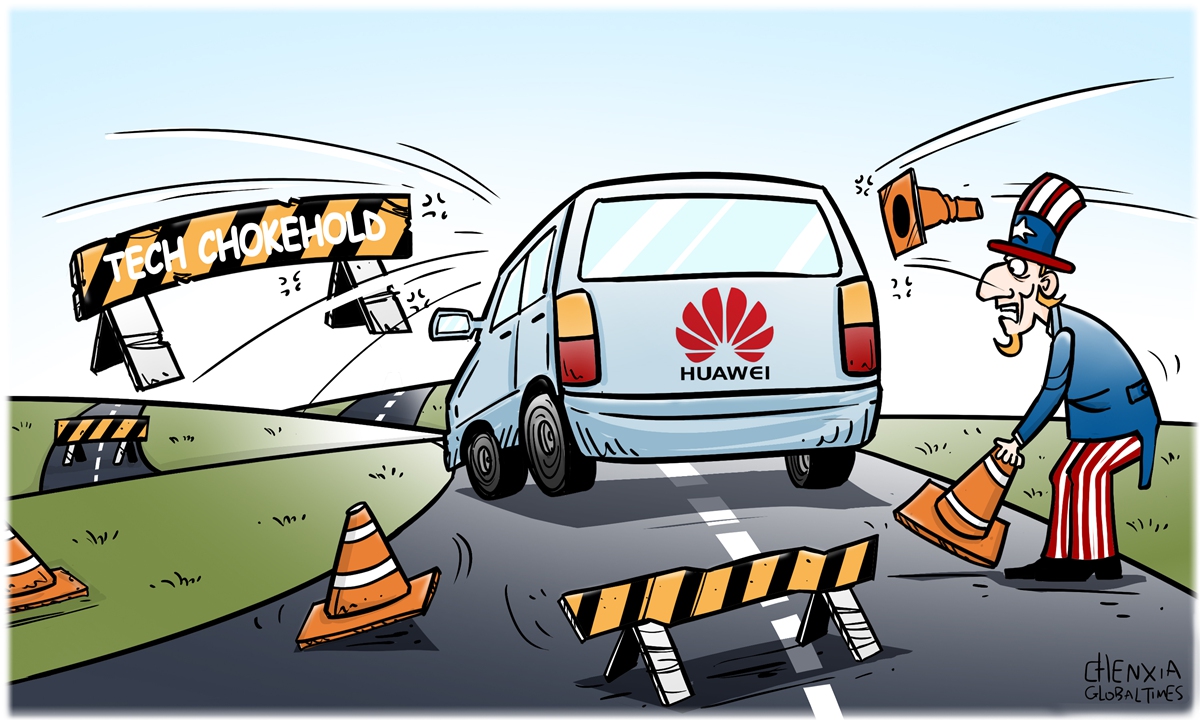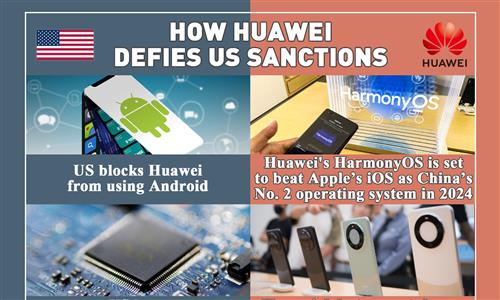
Breaking through barriers. Illustration:Chen Xia/GT
On March 29, Chinese tech giant Huawei released its annual report 2023 which showed that its overall operations met expectations, achieving global sales revenue of 704.2 billion yuan ($99.18 billion) and a net profit of 87 billion yuan ($12.25 billion).
Additionally, according to the latest statistics from market research firm Omdia, Huawei's share in the global communications equipment market (including small and large base stations) reached 31.3 percent last year, ranking first.
We particularly noted a statement in Huawei's annual report: By the end of 2023, the company's information and communications technology solutions have brought connectivity to 90 million people in remote regions in nearly 80 countries around the world.
Huawei, a Chinese company, has made impressive strides in the global telecommunications sector, serving as an excellent example of China's exceptional manufacturing capabilities. The company has demonstrated resilience, innovation and strategic market positioning despite challenges from the US and Western nations attempting to restrict its growth. This story is crucial in reshaping the global economic landscape, especially in driving growth in emerging economies.
Huawei's success demonstrates its unwavering focus on research and development, its ability to tailor solutions to meet the diverse needs of different regions, particularly developing and under-developed countries, and its achievement of cost-effectiveness without compromising quality.
It has facilitated a transformation in the global economic landscape, enabling these countries to share the fruits of globalization and embark on a fast track to development. Huawei represents Chinese companies that have contributed to the world's peaceful development.
Imagine what it will mean for the development of individuals and families and the economic development of their countries when more poor people in poor areas of the world have access to state-of-the-art communications equipment and become users of communications technologies that are no less advanced than those in developed countries.
This opens up more opportunities for them to choose development paths that align with their history, traditions and societies.
Chinese firms such as Huawei are collaborating and investing in emerging economies alongside the Belt and Road initiative, thereby enhancing the economic standing of these nations and exerting a substantial influence on global power dynamics.
It signifies a move toward a more diversified global technology and economic landscape and promotes greater autonomy among emerging economies. As these countries ascend to the worldwide stage with the advancement of new technology, they will play a more significant role in shaping the future international economic order.
This paradigm shift challenges the US and its Western allies, ultimately necessitating a reevaluation of the structural contradictions within their global strategies.
Their containment of Chinese companies with advanced technology will fail because the growth of these companies worldwide, especially in Asia, Africa and Latin America, follows the trend of global development progress and is the inevitable result of the redistribution of technological and economic power.
Asia alone, for example, has become the most dynamic and growth-potential region in the world, with 40 percent of the world's economy and contributing more than 70 percent to global economic growth. The contribution of Chinese enterprises cannot be underestimated.
Continuing to divide the world landscape and draw boundaries based on geopolitical strategies and interests is no longer compatible with the changes brought about by the ongoing development of emerging economies.
Huawei and many other Chinese firms' journey to the world remains challenging as the US and the West are still curbing their progress on various pretexts, including so-called security.
However, Huawei's emergence is also forcing more world-class manufacturers to be more proactive in the face of technological and market competition so that more emerging economies can benefit from fair competition.
Huawei's endeavor is not only a story about how Chinese companies are breaking through US containment and going global. This story is also about emerging economies.
With the push and application of new technologies like 5G, emerging economies will continue to rise, and we may witness the evolution to a more diversified, balanced and equitable new world order.

